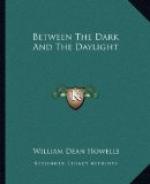“Well!” Rulledge snarled at this point, “he was a chump.”
Wanhope at the moment opposed nothing directly to the censure, but said that something pathetically reproachful in Mrs. Yarrow’s smiling looks penetrated to Alford as she nodded gayly from the car window to him in the little group which had assembled to see her off at the station when she left, by no means the first of their happy hotel circle to go.
“Somebody,” Rulledge burst out again, “ought to have kicked him.”
“What’s become,” Minver asked, “of all the dear maids and widows that you’ve failed to marry at the end of each summer, Rulledge?”
The satire involved flattery so sweet that Rulledge could not perhaps wish to make any retort. He frowned sternly, and said, with a face averted from Minver: “Go on, Wanhope!”
Wanhope here permitted himself a philosophical excursion in which I will not accompany him. It was apparently to prepare us for the dramatic fact which followed, and which I suppose he was trying rather to work away from than work up to. It included some facts which he had failed to touch on before, and which led to a discussion very interesting in itself, but of a range too great for the limits I am trying to keep here. It seems that Alford had been stayed from declaring his love not only because he doubted of its nature, but also because he questioned whether a man in his broken health had any right to offer himself to a woman, and because from a yet finer scruple he hesitated in his poverty to ask the hand of a rich woman. On the first point, we were pretty well agreed, but on the second we divided again, especially Rulledge and Minver, who held, the one, that his hesitation did Alford honor, and quite relieved him from the imputation of being a chump; and the other that he was an ass to keep quiet for any such silly reason. Minver contended that every woman had a right, whether rich or poor, to the man who loved her; and, moreover, there were now so many rich women that, if they were not allowed to marry poor men, their chances of marriage were indefinitely reduced. What better could a widow do with the money she had inherited from a husband she probably did not love than give it to a man like Alford—or to an ass like Alford, Minver corrected himself.
His reductio ad absurdum allowed Wanhope to resume with a laugh, and say that Alford waited at the station in the singleness to which the tactful dispersion of the others had left him, and watched the train rapidly dwindle in the perspective, till an abrupt turn of the road carried it out of sight. Then he lifted his eyes with a long sigh, and looked round. Everywhere he saw Mrs. Yarrow’s smiling face with that inner pathos. It swarmed upon him from all points; and wherever he turned it repeated itself in the distances like that succession of faces you see when you stand between two mirrors.




